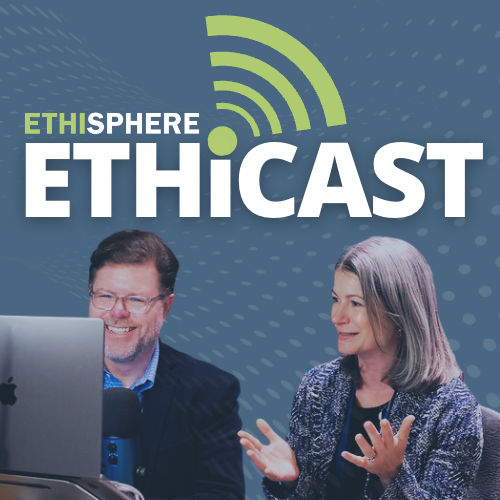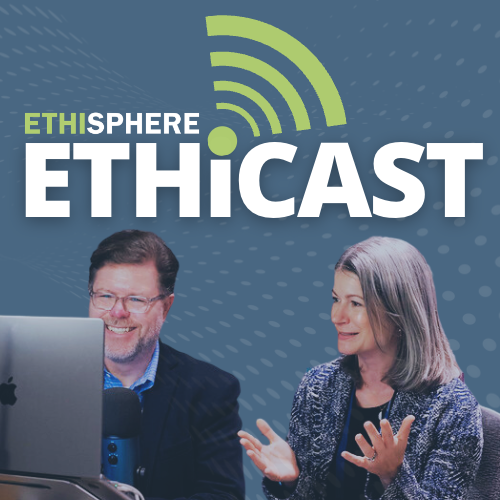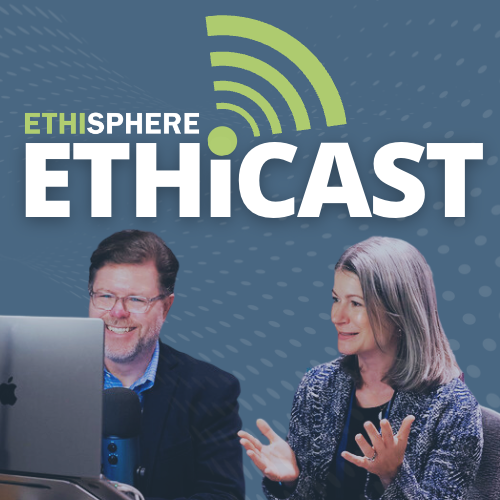Episode Transcript
[00:00:00] Speaker A: Hi everyone. You've got questions and we've got answers. Welcome to another Bella Asks episode of the Ethicast.
The Business Ethics Leadership alliance, or bela, is a global ethics and compliance community that provides exclusive access to helpful data, benchmarking events and other resources to advance your ethics and compliance program.
One of those resources is Bella's Concierge service in which members can submit any question at all regarding ethics and compliance and our internal experts will provide an answer plus helpful resources with more information.
Now, while we invite everyone watching and listening to join bella, we also know that there is no competition in compliance. So that's why we're using this program to thematically respond to high level questions from the Bella community with for the benefit of ENC teams everywhere.
And joining us once again to answer those questions is Bella chair Erica Salmon Burn. Erica, as always, it is terrific to see you back in the program.
[00:01:06] Speaker B: Oh Bill, thanks for having me back. And we've got a great question today.
[00:01:11] Speaker A: We do. Our next question involves insider trading and AI and it reads the SEC is using AI to uncover potential insider trading. How can I use AI to prevent insider trading enforcement actions within my organization?
[00:01:26] Speaker B: Yep.
Yeah, it's a great question Bill, and I apologize in advance to all of the listeners out there because I'm going to take us on a little bit of a journey here because this, this question actually brings a couple of things to mind for me. So first off, what is the SEC actually doing? To be clear, for years the SEC has been looking for suspicious trading patterns, right? That's one of the ways that they are trying to spot insider trading. So you know, they've been, they've been using data analytics and trading patterns for years and years and years and years. Now the difference is the, the power of AI allows them to do that and in a far accelerated fashion. And Bill, we've had various folks on the Ethicast proper, right, the proper athecast program talking about the SEC going back to basics, Talking about the SEC's kind of focus on fairness in the, in the, the, the trading environment and the use of data analytics and AI. So this is, should not be news to longtime listeners of the Ethicast that this is happening.
The thing that is news I think is some of what those that, that enhanced data analytics, algorithmically driven computer run power is, is allowing the SEC to uncover. And so part of, part of the reason, one of the first things that, that came to mind for me, Bill, when we first came across this particular question was a story from the end of June about The SEC filing insider trading charges against a couple of employees who worked for one of the EDGAR filing companies. So this story is like one of those Venn diagrams of third party risk, abusive information received from your position AI and insider trading. Right. It was a, it was a big, great big kind of mashup of all four, because what happened in this particular case is there were these two people, they worked for a business that provided services to companies who were publicly traded who were looking to get their 10Ks, 10Qs and other required disclosure forms onto the SEC's Edgar filing system. So Edgar, of course, is the filing system that if you are publicly traded, you use to get all of your information properly filed and out to the investors and other. Right. And other stakeholders on the cadence of the SEC's choosing. Right.
Separately. Sidebar. Bill, you and I can talk at some point about whether or not we are actually going to move away from quarterly reporting, but that's a, you know, that's a, that's a different conversation entirely.
[00:03:52] Speaker A: Yeah.
[00:03:53] Speaker B: Anyway, what ended up happening was these two individuals became aware of information before it was public because they had access to it as a result of the job they played, taking not yet public information, loading it properly into the EDGAR system, and then it would of course become public. And they took advantage of that window where they had access to that kind of information to engage in tipping behavior for friends and family members that made money off of the trades.
So standard tipping case, right? Absolutely. 100% standard tipping case. We see this with law firms working on mergers and acquisitions. We saw this with a guy during the pandemic overhearing his wife talking about M and A deals, you know, from her home office. So that pattern of behavior is not new.
What is new is that the SEC found it because of their enhanced algorithmic activity.
So as you as a compliance officer think about that, if that's the way the government is using this tooling, you need to think about how you're going to use this tooling as well.
And you should be thinking about it in the context of your third parties. And look, I'm sure there are compliance officers out there thinking to themselves, well, the EDGAR filing system is investor relations problem. Right. Like, I don't work. That's, you know, that's our, that's our securities council's problem. Like that. I don't work on that system.
But if you are part of the 84% of our data set that has responsibility for third party risk management, it is your problem. Right. Because they're a third party. And so thinking about where's the information going, what exposure does the company potentially have, what kind of harm could potentially be caused by that, and how could I use some of these technology tools to get out in front of those things?
Those are the kinds of things that I want compliance officers and compliance teams thinking about as it comes to some of these key long standing risks. I mean, look, Bill, people have been insider trading for as long as there's been trading.
New and different is the way we can potentially catch some of this. And so that's part of the reason why I'm so excited by the AI report that we've created in conjunction with our partners has some really wonderful guidance in IT for compliance teams that are trying to figure out how to use this new technology.
[00:06:13] Speaker A: Well, Erica, thank you so much for offering your thoughts on this. I know it's a great topic, especially since it touches upon AI, which is so rapidly and substantially transforming pretty much everything the ENC touches nowadays, especially how we predict and mitigate and prevent bad things from happening. So once again, thank you so much for offering your thoughts on this.
[00:06:32] Speaker B: Oh, my pleasure. Absolutely. And for those of you who didn't happen to catch this. Oh shoot, who's my third party story?
We'll drop a link to it in the show notes so that you can read up on exactly what what what these two guys decided to do.
[00:06:45] Speaker A: To learn more about Bella, visit ethisphere.com bella that's B E L A to request guest access to the member resource hub and to speak with the Bella Engagement Director. If you have a question that you would like answered on this program, contact the Bella Concierge Service and we'll get to work on it for you.
This has been another Bella Asks episode of the Ethicast. Thank you so much for joining us. We really hope that you've enjoyed the show. If you haven't already, please like and subscribe on YouTube, Apple Podcasts and Spotify. And also please be sure to tell a colleague or two about us as well. It really helps expand the reach of the program.
That's all for now, but until next time, remember, strong ethics is good business.


